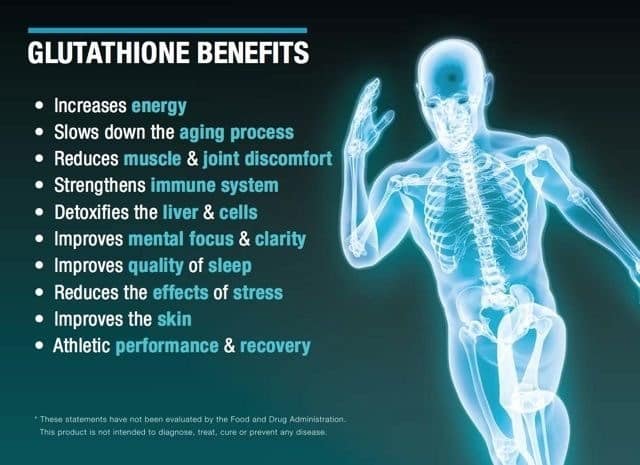Health Effects your cells contain glutathione, which is a substance made from three amino acids: cysteine, glutamate, and glycine.
Glutathione acts as an important antioxidant in your body. That means it helps combat free radicals.
However, these are molecules that can damage your body’s cells.
In fact, glutathione plays a role in many chemical reactions in your body.
It also helps detoxify chemicals, including some that your body creates naturally, as well as pollutants and drugs.
Your supply of glutathione seems to decrease as you get older, possibly because your body can’t create as much.
In fact, Lower glutathione levels appear to go hand-in-hand with poorer health.
For instance, lower levels may play a role in many conditions that are more likely to develop in older people.
Your glutathione levels may also decrease during certain health problems, such as:
- Cancer
- HIV/AIDS
- Type 2 diabetes
- Hepatitis
- Parkinson’s disease
However, some people take glutathione:
- For its antioxidant power
- As a detoxification agent
- To attempt to protect themselves from the harmful effects of radiation and chemotherapy for cancer
People also take glutathione to try to treat weakened immune systems or infertility, as well as many other conditions.
In fact, taking glutathione by mouth does not appear to be an effective way to get it into your body.
In fact, In one study, giving healthy people 500 milligrams twice a day for a month didn’t raise the level of glutathione in their blood.
Some other studies looking at its health effects have used it in injection form or as a treatment inhaled into the lungs.
Health Effects: Glutathione Supplements
- Curcumin
- N-acetylcysteine
- Selenium
- Silymarin
- Vitamin C
- Vitamin E
In fact, your body doesn’t seem to absorb glutathione well from foods.
However, certain foods high in amino acids that contain sulfur may help boost your levels.
These include:
- Unprocessed meat
- Garlic
- Broccoli
- Asparagus
- Avocados
- Spinach

